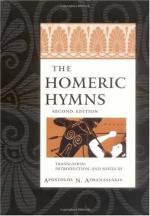So spake he, and raising in both hands the tortoise, went back within the dwelling, bearing the glad treasure. Then he choked the creature, and with a gouge of grey iron he scooped out the marrow of the hill tortoise. And as a swift thought wings through the breast of one that crowding cares are haunting, or as bright glances fleet from the eyes, so swiftly devised renowned Hermes both deed and word. He cut to measure stalks of reed, and fixed them in through holes bored in the stony shell of the tortoise, and cunningly stretched round it the hide of an ox, and put in the horns of the lyre, and to both he fitted the bridge, and stretched seven harmonious chords of sheep-gut. {136}
Then took he his treasure, when he had fashioned it, and touched the strings in turn with the plectrum, and wondrously it sounded under his hand, and fair sang the God to the notes, improvising his chant as he played, like lads exchanging taunts at festivals. Of Zeus Cronides and fair-sandalled Maia he sang how they had lived in loving dalliance, and he told out the tale of his begetting, and sang the handmaids and the goodly halls of the Nymph, and the tripods in the house, and the store of cauldrons. So then he sang, but dreamed of other deeds; then bore he the hollow lyre and laid it in the sacred cradle, then, in longing for flesh of kine he sped from the fragrant hall to a place of outlook, with such a design in his heart as reiving men pursue in the dark of night.
The sun had sunk down beneath earth into ocean, with horses and chariot, when Hermes came running to the shadowy hills of Pieria, where the deathless kine of the blessed Gods had ever their haunt; there fed they on the fair unshorn meadows. From their number did the keen-sighted Argeiphontes, son of Maia, cut off fifty loud-lowing kine, and drove them hither and thither over the sandy land, reversing their tracks, and, mindful of his cunning, confused the hoof-marks, the front behind, the hind in front, and himself fared down again. Straightway he wove sandals on the sea-sand (things undreamed he wrought, works wonderful, unspeakable) mingling myrtle twigs and tamarisk, then binding together a bundle of the fresh young wood, he shrewdly fastened it for light sandals beneath his feet, leaves and all, {138}—brushwood that the renowned slayer of Argos had plucked on his way from Pieria [being, as he was, in haste, down the long way].
Then an old man that was labouring a fruitful vineyard, marked the God faring down to the plain through grassy Onchestus, and to him spoke first the son of renowned Maia:
“Old man that bowest thy shoulders over thy hoeing, verily thou shalt have wine enough when all these vines are bearing. . . . See thou, and see not; hear thou, and hear not; be silent, so long as naught of thine is harmed.”




